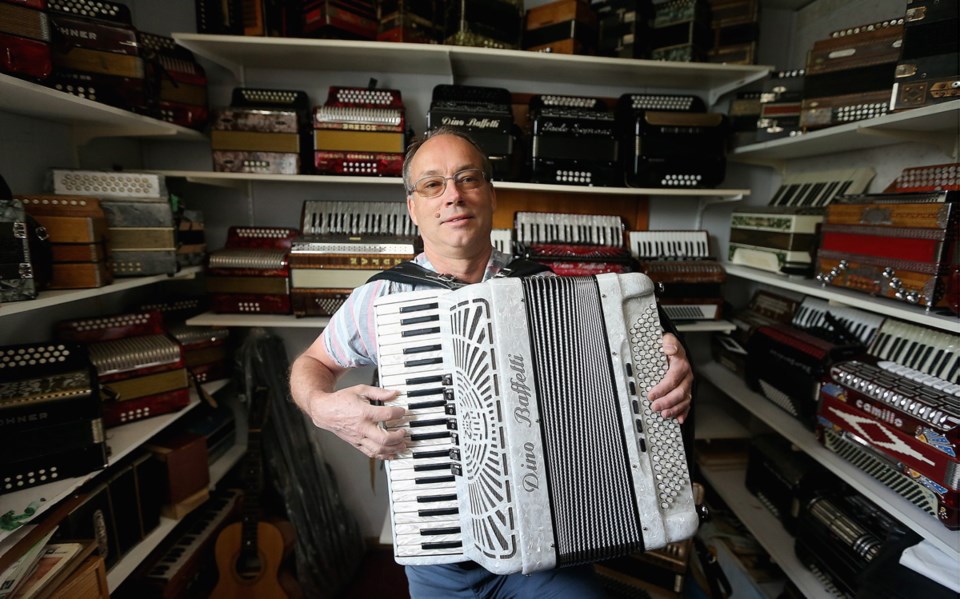Just when you thought things couldn’t get worse, some truly terrifying news: Accordion sales are going through the roof.
“It’s crazy,” exclaims Martin Hergt, who owns Tempo Trend Music on Burnside Road. His phone won’t stop ringing. Emails are flying in from all over the world.
Yes, his little shop was already B.C.’s go-to source for squeezeboxes, but that usually means selling two accordions a month, not the 40 that he just shipped out in 24 days.
“I just packed one up to go to Wales,” Hergt says. Most go to the U.S., but he has also sent instruments to Iceland, Finland, Mexico.
“This is unprecedented. In 46 years in the family business, I’ve never seen anything like this.”
Why? The roots go back to last summer, when he linked up with a YouTube accordion guru named Moshe Zuchter to make a video on how to buy a used instrument. “It’s that video that has spawned a lot of what’s going on now,” Hergt says.
But the real driver came when we were struck by the twin plagues of A) COVID-19 and B) lockdown fever, the latter being the malady that led directly to the spread of what a neighbour of mine dubbed C) the accordivirus, an affliction linked not to unwashed hands, but idle ones.
That is, Hergt’s new customers are people with too many empty days and not enough stimulation. “They have the time and they’re bored with binge-watching Netflix,” is the way he puts it.
Now, I should hasten to add that I am not anti-accordion. I have not missed its pop-culture migration from 1980s parody fodder (check out John Candy and Eugene Levy as the Schmenge Brothers) to symbol of uberhipness, a flag waved by every flannel-clad band from Arcade Fire to Mumford and Sons. It is, as Hergt says, a wonderfully flexible instrument that crosses cultural borders and musical genres.
No, my quarrel is not with those who play the accordion, but rather with those who have chosen the shutdown as a good time to LEARN TO DO SO.
This can be applied to any instrument: electric guitar, recorder, bagpipes. Good lord, can you imagine being trapped in the same house as that? I say this as someone who once had two family members take beginners’ violin at the same time. (Old joke: What does a violin lesson have in common with an episode of Law and Order? Everyone is happier when the case is finally closed.)
The sound of musical growing pains isn’t even the worst thing about this trend, either. No, what really grates is having to share the pandemic with those who have seized upon their unexpected bonus down time as an opportunity for self-improvement.
For here’s the real problem: There is a distressingly large segment of the population who, instead of drinking themselves wobbly by 10 a.m. like normal people, have decided this is a good time to learn something new. And they’re making the rest of us, the ones whose ambitions got no further than the discovery of Gomer Pyle reruns on MeTV, look bad by comparison.
“I just signed up for online Spanish classes,” these bright-eyed zealots boast. “Yesterday, I learned how to tie flies on YouTube. Tomorrow, I’m replacing my lawn with kale. Also, fingers crossed, I think I found a vaccine.”
These are the same chipper bastards who taunt you with photos of homemade bread on Twitter. Meanwhile, you’re eating Cheezies for breakfast.
So now, in addition to all the other stress, you’re feeling pressure to fill your free time* productively, as though it were a not-to-be-squandered gift from God, as opposed to the unwanted consequence of a pandemic. (*The concept of “free time” might be confusing to parents of housebound children.)
Oh, it’s a strange and changing world these days. Hergt notes that back at the beginning of the beginning of the looniness, during the days of the Great Toilet Paper Panic, someone in Britain posted a picture of shelves full of accordions with a sign reading “Limit two per family.” That was a joke then, but look at the surge in popularity now.
FYI, a brand new, full-sized, Italian- or German-made accordion will go for $5,000 to $8,000. Almost all the ones Hergt sells are used, though, with beginner-level models costing $300 to $1,000. If that sounds good, give it a shot.
But if you don’t feel compelled to learn something new, that’s OK, too.



